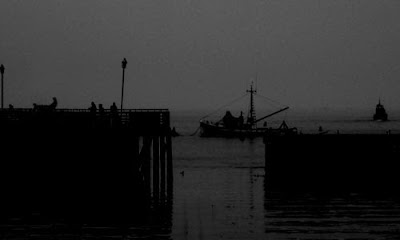
 I rowed our little inflatable dinghy along the breakwater. A huge sea lion got interested, and followed suit. I felt a bit uneasy by the thought of an attack. I had no idea what these kinds of animals were up to.
I rowed our little inflatable dinghy along the breakwater. A huge sea lion got interested, and followed suit. I felt a bit uneasy by the thought of an attack. I had no idea what these kinds of animals were up to.I started to think about Jean Baudrillard, the French philosopher. Watching tourists in Monterey had somewhat made me understand what Jean Baudrillard meant by 'hyperreality'. The fishing industry was replaced by the tourist industry, which simulated the fishing industry through toys and replicas; people took images that had already been taken from the past.
I scanned the concrete wall for a ladder but there were none. I kept rowing, thinking about Jean Baudrillard.
























